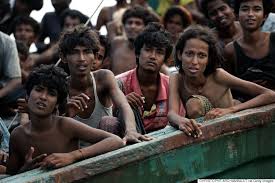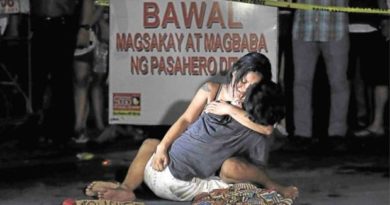COLUMNS – WORLD VIEW: Cox’s Bazar, Bangladesh- Educating Myanmar’s youngest refugees
Cox’s Bazar, Bangladesh—Sofia Begum is a case study in the power of hope. Three months ago, armed vigilantes attacked the six-year-old’s village in Myanmar’s Rakhine State. Sofia saw neighbors killed, an uncle wounded by gunfire, and her home razed.
Miraculously, Sofia, her parents, and two younger brothers survived. After an arduous four-day journey that included evading militias and making a perilous river crossing, they reached safety in neighboring Bangladesh. “Now I want to be back in school,” Sofia says. “I miss reading and playing with my friends; I want to be a doctor.”
Sofia’s father is even more emphatic about her future. “Without learning, what chance will my children have for a better life?” he asks. “They need to be in school.”
.
.
If only the international community shared that view.
The Rohingya refugee crisis is also an education crisis. More than 655,000 people, some two-thirds of Myanmar’s total Rohingya population, have fled to Bangladesh seeking sanctuary from the killing, rape, burning, and looting in Rakhine State. Yet, although some 60 percent of the displaced are children, education provision for Myanmar’s youngest refugees remains woefully insufficient. Few are in school, and there is no coordinated plan for universal education.
The scale of the crisis and the speed with which it has unfolded are part of the problem. In just a few months, a population the size of Boston flooded into southeast Bangladesh, one of the poorest areas of a very poor country. The new refugee camps are among the most densely populated places on Earth, and the inhabitants are desperate for shelter, nutrition, healthcare, clean water, and sanitation. Education is just one of the many needs competing for a dearth of international aid.
Political obstacles also loom large. The government of Bangladesh has demonstrated extraordinary generosity in responding to the crisis, providing land, keeping borders open, and helping to build new settlements. Prime Minister Sheikh Hasina is rightly regarded as a global leader on refugee response.
But the government also insists that the Rohingya are guests, and must return to Myanmar. The two countries’ foreign ministers signed an agreement in November calling for the “safe and voluntary” repatriation of refugees to begin early this year. The Bangladeshi government worries that providing education could be interpreted as a move toward granting refugees permanent residency. Humanitarian agencies are left tinkering at the margins of education provision through a fragmented patchwork of small-scale projects.
After being denied citizenship in Myanmar, an entire generation of Rohingya is now being denied the right to education. Former British prime minister Gordon Brown, the United Nations’ special envoy for global education, has challenged the generalized neglect of schooling in humanitarian emergencies. In the case of the Rohingya crisis, insufficient funding has been compounded by wider failures by humanitarian agencies, including weak coordination, turf battles, and differences over which curriculum should be used—an apparently esoteric issue that has become entangled with questions about Rohingya children’s future status.
The starting point for any strategy on education has to be a practical recognition that an early solution of the crisis is unlikely. Given the ferocity of the attacks on the Rohingya, and the failure of Myanmar’s leaders to provide credible security guarantees, few refugees will voluntarily return to Myanmar anytime soon.
Education is a right to which even the displaced are entitled. Arguing about future residency status is a distraction. Low-cost, temporary schools can be made from bamboo, with lessons delivered by refugee teachers equipped with Burmese-language material. None of this would imply permanent residency in Bangladesh. What it would do is restore the hope that comes with education.
.
.
The international community should act immediately—and decisively—to deliver universal education for Rohingya children. What is needed is a single, well-coordinated plan of action aimed at getting all children into school in the first half of 2018.
The World Bank has set up a $2-billion fund to provide rapid support to countries hosting large refugee populations. Now is the time to use it. Money from multilateral organizations, like the Global Partnership for Education and Education Cannot Wait, should also be deployed. Project Syndicate
Kevin Watkins is CEO of Save the Children UK.
COURTESY:
By: Kevin Watkins
Philippine Daily Inquirer
05:02 AM January 27, 2018
.NOTE : All photographs, news, editorials, opinions, information, data, others have been taken from the Internet ..aseanews.net | [email protected] |
.
For comments, Email to :
JARED PITT | [email protected] | Contributor









